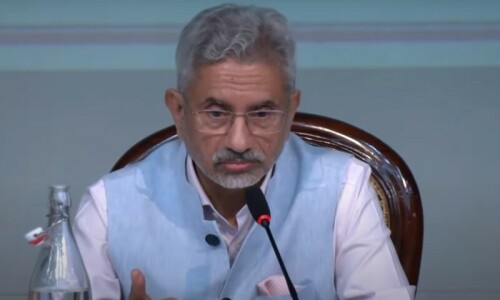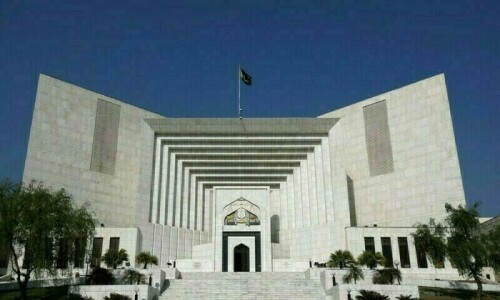“Don’t walk the plank like I did You will be dispensed with. When you’ve become inconvenient… I can’t take the pressure No one cares if you live or die They just want me gone, they want me gone… We Think The Same Things At The Same Time We Just Can’t Do Anything About It. There are so many of us so you can’t count.” Thom Yorke – Harrowdown Hill
The prisoners who were snatched up by Pakistan’s intelligence agents years ago from Adiala prison hobbled their way into Pakistan’s Supreme Court recently. Their deteriorated condition was enough to illicit gasps from members of the Court, and one of the prisoner’s mothers suffered a fatal heart attack the day after seeing her tortured and emaciated son.Unfortunately, there are many more mothers who will grieve for their sons without knowing their fate under the military’s policy of enforced disappearance. If the Supreme Court wishes to tackle the illegal actions of the military, they will need to start by striking down several laws permitting the military to indefinitely detain citizens, prosecute them under military tribunals, and deny them their right to appeal.
While many believe that the Army is acting without regard for the law in their kidnapping and illegal detention of “terrorist suspects”, they are mistaken. The power to wage this aggression is codified by law, the first dating back to 1952. The 1952 Army Act has been used to legally justify military detentions, even though its provisions violate constitutional principles.
Article 133 of this act states, “it is hereby declared that no appeal… shall lie in respect to any proceeding or decision of a court martial to any court exercising jurisdiction anywhere.” Similarly, the Pakistan Armed Forces Acting in Aid of Civil Power Ordinance of 1998 states that a suspect who was convicted by a military tribunal can not appeal to any civilian court. Rather, they must appeal to the military for relief, and the appellate military court’s judgment “shall be final and shall not be called in question before any court.”
The Army Act was further expanded in 2007, such that it can now be used against military personnel and civilians alike. The 2007 Amendment allowed the military to detain and court martial civilians suspected of the following crimes: condemnation of the creation of the state and advocacy of abolition of its sovereignty, sedition, and giving a statement conducive to “public mischief.”
The changes to the Army Act were installed partly to subject the Baloch to military detention and tribunals. Balochistan has always been an epicenter for ethnic nationalism in Pakistan, with a popular movement calling for a secession from the “occupying” Pakistani state. Therefore, the Army Act expanded the Army's ability to deprive Baloch citizens of their right to appeal before a civilian court.
The military was granted greater power in 2010 when President Zardari signed the “Actions (in Aid of Civil Power) Regulation 2011 for Fata.” Though this legislation gave powers to the President over the military, it is currently being abused to allow for indefinite “internment” of suspected terrorists by the military. The counsel for the Army recently stated that the individuals involved in the Adiala case before the Supreme Court are being detained under this Regulation. This essentially means that the military can indefinitely detain any individual without charging them with any crime or releasing information about their detention to their families.
The Supreme Court has flexed its muscles recently and publicly displayed its ire against a non-compliant civilian government. The Zardari-led administration has certainly played a waiting game with the Supreme Court, which has drawn criticism that the President is standing in the way of an independent judiciary. However, the greatest menace to an independent judiciary is the military, through the above mentioned articles that deprive the Supreme Court of Pakistan the right to hear appeals from citizens.
The Supreme Court must rule that the military’s power to exclusively prosecute individuals, denying them the ability to appeal to a civilian court, is void ab intitio, or void from the start. Article 10a of the Constitution ensures the right to a fair trial and the Federal Shariah Court of Pakistan interpreted this Article as guaranteeing, “the right of appeal [as] a substantive right.” Further, the military should not be able to “court martial” civilians as is permitted under the Army Act, considering the several constitutional guarantees to a just trial in Pakistan’s Constitution.
However, the Constitution also contains a roadblock for attempting to bring the military in check. Article 199 (3) states that the Supreme Court cannot pass any order “in relation to a person …who is for the time being subject to any law relating to any of those Forces.” Therefore, there must be an amendment passed that nullifies Article 199 (3) which can be done most expeditiously by the Parliament and President.
Though this is unlikely to happen, the only way to truly confront the military’s extrajudicial behavior is through a united attack by judges and politicians. The issues confronting suspects in military detention will not subside unless all branches of the government take immediate action to reign in the military’s abuses. Just as these abuses were facilitated by laws, these old laws will have to be nullified by the Courts and new laws will have to be created by Parliament. Without such a dual approach, the injustices faced by suspects in military detention will continue, and mothers will continue to desperately wonder where their children have “disappeared” to.

The views expressed by this blogger and in the following reader comments do not necessarily reflect the views and policies of the Dawn Media Group.











































